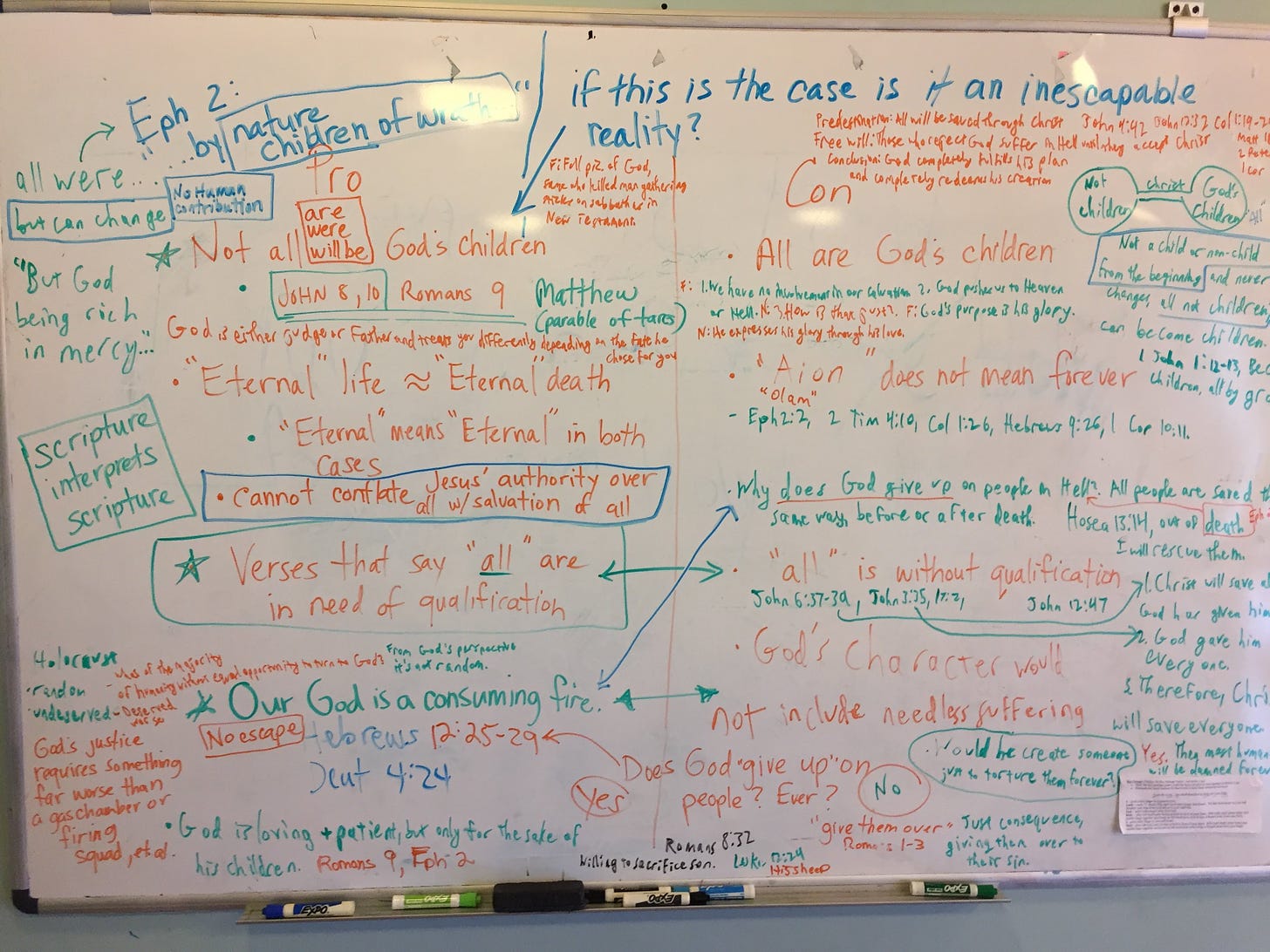My weekend bike rides had expanded in order to ask people about their beliefs. I visited every major Christian sect, sometimes three in a day with a 7am Episcopalian gathering on to a 10am Catholic mass only to immediately join for an 11am Baptist service. As the pastors or elders left the pulpit, I’d ask their thoughts on universalism. In short, my argument was as follows:
1. God is infinite and no human comprehends his nature.
2. The God of the Bible is referred to by many names across many languages
3. Therefore, since it is neither our perfect understanding nor the exact words we use that identify whether we are addressing the true God or idols, then it is unknown whether or not any nominally non-Christian theist is worshipping God or an idol.
The cutoff between someone being in a true religion or a heathen seemed arbitrary. I tried with every ounce of desperate willpower to find a way to reconcile my questions with the worldview I grew up with. In this endeavor, I latched onto one last idea: the Temporal Hell Theory. In that theory, Hell is the same on earth because at any time a sinner may repent and be saved through Jesus Christ. The difference is that Hell removes more of God’s presence and “turns up the heat” by giving the unrepentant a taste of the freedom they are asking for, which results in human produced chaos and suffering. In other words, “The doors of Hell are locked from the inside.” However, since every human soul is eternal and in an eternal time span any event that has any chance of occurring will occur at some point, therefore every human would eventually end up in Heaven. In this way, God would have given both free will to humanity and determined that all his creation would be redeemed. It alters the Bible from a story of an authoritarian deity condemning huge populations to eternal torture with no hope of escape to instead being an example of a loving father allowing his children to explore their own journeys and make the choice to return to him when they are ready.
I and the leader of my church’s prison ministry agreed to an eight-week series of debates. With the premise that we have access to the perfectly accurate original Greek of the New Testament today in the 21st century, the argument hinged largely on the fact that the Greek word “aion” or “eon” does not mean eternal but instead means “a long time.”

I remember a story that my elder told me during one of our sessions. On his rounds as a prison guard, he noticed one of the inmates gurgling and flailing his legs as he hung from a makeshift noose. My church elder watched him struggle for a moment. He told me that he knew the terrible crimes that prisoner had committed, and he wondered if it wouldn’t be better if he died. But he knew that it wasn’t his place to decide who lives and who dies, so with a sigh he opened the cell door and saved the man’s life. “He must not have really meant it. He knew we would stop him,” he explained.
I had previously also considered annihilationism, the theory that the lake of fire which follows Hell is a spiritual cremation center where unrepentant souls are destroyed. This meant that we, the damned, would at least have an end to our suffering.
But in the mainstream explanation of Hell in Abrahamic religions, there is no escape from God’s wrath. I couldn’t imagine a more tyrannical and abusive story. I could not believe in a God who condemned people to eternal damnation.
For perhaps the previous two years, a majority of my internal dialogue consisted of messages directed to God. Now, as thoughts formed in my mind, I no longer felt that I sent them to anyone. Instead, they sat in a vat in my skull surrounded by void.
Out of the mosques, Sikh gurdwaras, Buddhist temples, and other religious centres I had been attending, the Hindu temple had the best free food. It seemed as good a reason as any to exist there. Sunday mornings I could be found swaying to mantras rather than in the sanctuary of my church. I found both comfort and confusion in how a teacher I met there casually agreed that many religions have aspects of truth and evidence of historical cross-polination.
All the competing perspectives piled up on one another until a creeping realization dawned on me. I could no longer deny it. I had lost my faith. Everything that had been my signal for belonging and truth shattered, and I felt myself drowning in numb despair. I remember the moment I realized this. I lay on the couch staring at shifting rainbow flakes drifting across the ceiling as a solar powered perambulating prism turned its gears. Memories overlapped and wrestled with one another as a song by Jukebox the Ghost coursed through my ears. My philosophy professor spoke in the voice of Rick Sanchez, my teacher at the temple morphed into my Brazilian Jiu Jitsu coach, and arguments for universalism formulated and broke down when I heard the lyrics slice through my ruminations, "why the hell would I believe what God wants me to believe when there's more than a few manuals from which to choose?"
I needed to find a new manual.


